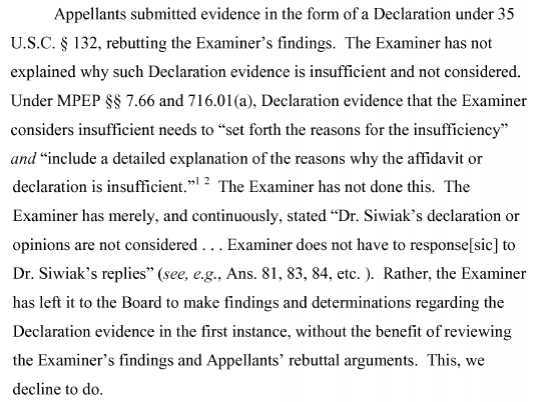We have covered some issues related to Declaration evidence in previous posts (here, here, here, and here, for example).
In some cases, examiners and their supervisors simply ignore declaration evidence. While that might be fine if the applicant was entering the evidence for a subsequent appeal they anticipated needing no matter what, the question remains as to whether there is anything the applicant can do with the examiner who ignores declaration evidence.
Note that MPEP 716.01 addressed the issue specifically. The MPEP sets for several criteria applicable to all evidence traversing rejections submitted by applicants, including affidavits or declarations. The MPEP requires that the applicant enter the evidence in a timely manner, which means before a final rejection or appeal. However, there is an option to enter the evidence after final, but before appeal, upon a showing of good and sufficient reasons. Otherwise, you will need an RCE to have the evidence entered into the record. This first part is just about whether the evidence is entered into the record, but the second part of the MPEP section refers to the consideration of that evidence once entered.
Specifically, the MPEP states that evidence traversing rejections, when timely presented, “must be considered by the examiner whenever present.” Further, the MPEP goes on to state:
All entered affidavits, declarations, and other evidence traversing rejections are acknowledged and commented upon by the examiner in the next succeeding action. The extent of the commentary depends on the action taken by the examiner. Where an examiner holds that the evidence is sufficient to overcome the prima facie case, the comments should be consistent with the guidelines for statements of reasons for allowance. See MPEP § 1302.14. Where the evidence is insufficient to overcome the rejection, the examiner must specifically explain why the evidence is insufficient. General statements such as “the declaration lacks technical validity” or “the evidence is not commensurate with the scope of the claims” without an explanation supporting such findings are insufficient.
So, what do you do if an examiner and/or supervisor simply refuse to consider declaration evidence? One approach is to petition. Another is to use their failure as a basis for reversal in an appeal (as while this issue is partly procedural, it is also substantive and so both petition/appeal avenues are open). Using bigpatentdata.com, it is easy to find some examples of this. Consider US 13/045,932, where the applicant appealed a rejection in which the examiner expressly refused to consider and/or respond to declaration evidence. The entire appeal was decided* based essentially on the violation of MPEP 716.01 (and the legal theory of appeals). From the PTAB’s decision

So, if an examiner refuses to follow the MPEP, do not be afraid to take it to the PTAB as the entire appeal can be won on this simple issue.
* The substantive rejections were all reversed, but a double patenting rejection (that was not appealed) was sustained, thus the decision was “affirmed-in-part.”

Leave a comment